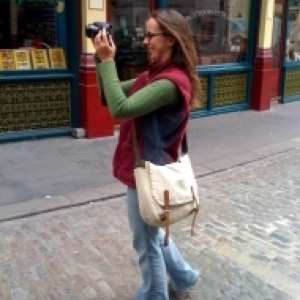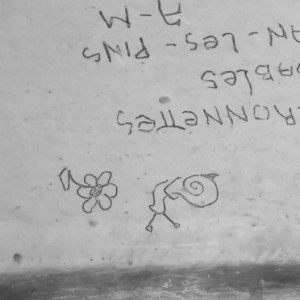Gimme shelter
I was lounging about at home and Fred was out on his bike when, at 2.40, Fred texted to say that weren't we supposed to be at the Clapham South Underground tour at 3.20. Gah! That event had fled from my radar. Some frantic pedalling home (Fred) and logistics (me) and we jumped in an Uber and sped off to Clapham South, getting there in just in time. Phew.
We were really glad not to miss it – I think it's the most interesting of the Hidden London tours we've done so far. Things I learned:
• Eight deep-level shelters were purpose-built after the start of WWII along the northern line and one on the central line to shelter people from bombs, but they weren't really used until 1944
• People had to take all their bedding with them, including mattresses! There are 190 spiral steps down (and then back up). The shelters weren't popular.
• 8,000 people could fit inside one of the shelters (but only four toilet blocks that weren't emptied as often as they should have been – it was very smelly)
• Tea was tuppence, a pence dearer than on street level, but there were sweet things, which were rare on street level because of rationing (the rations didn't apply in the shelter)
• There were free health checks in the medical room (this was before the NHS, so at street level people had to pay to see a doctor).
• After the war, they were made into hotels for a penny a night: "Penny Hotels", they were soldier barracks, and accommodation for youth groups (see inset picture of some graffiti by a lass from Belgium – upside down because it was made on the curved ceiling while she was lying in her bunk). It was also a Festival Hotel for the Festival of Britain in 1951, but this time at £4 a night.
This was the piece of information I found most interesting – the Clapham South deep shelter was the accommodation for the people who arrived in Britain from the Caribbean on the Empire Windrush. A labour centre was set up in the shelter and chaps from Coldharbour Lane, near Brixton, were drafted in to give jobs to the newly arrived folk. And so, because all the jobs were around Brixton, this is why there's such a big Caribbean community there. This wasn't meticulously planned – the government just cobbled together the Clapham South accommodation and the nearest labour office at the last minute, realising that 1,000 people were arriving with no place to sleep and all would be looking for work!
I treated Fred to a meal at The Pepper Tree (delicious Thai food) in Clapham then went to a nearby road to find the house of my great-great grandparents. I must have seen it, but the numbers don't tally to the number I have on my research. Over the course of history, two roads have become one and I think the numbers were confuddled. I'll have to find an old map to figure it out. It was fun to have a look, though.
In the evening, we watched Lion and my face leaked a lot. It's a remarkable story.


Comments
Sign in or get an account to comment.


